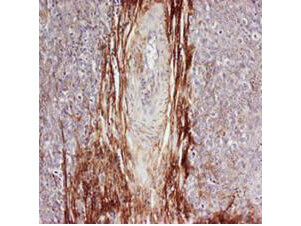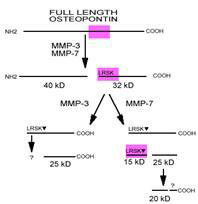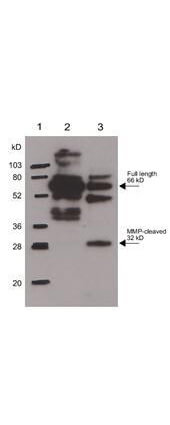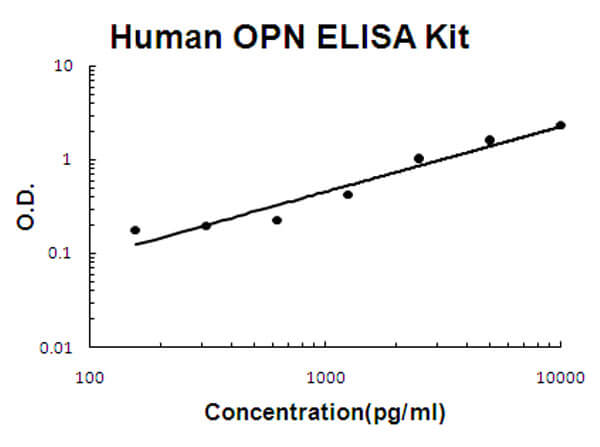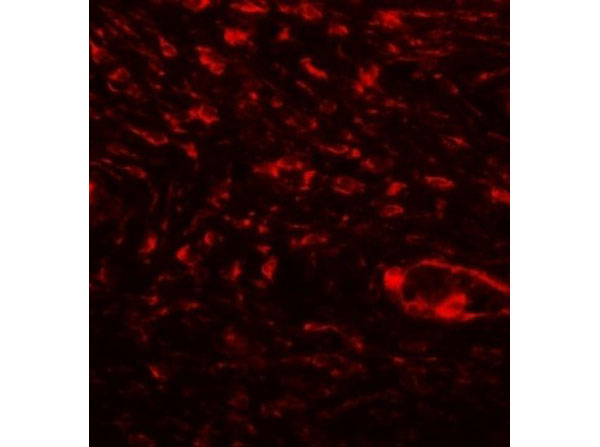Datasheet is currently unavailable. Try again or CONTACT US
Osteopontin Antibody
Rabbit Polyclonal
4 References
100-401-404S
100-401-404
25 µL
200 µL
Liquid (sterile filtered)
Liquid (sterile filtered)
WB, ELISA, IHC, Other
Human
Rabbit
Shipping info:
$50.00 to US & $70.00 to Canada for most products. Final costs are calculated at checkout.
Product Details
Anti-Osteopontin (RABBIT) Antibody - 100-401-404
rabbit anti-Osteopontin antibody, Osteopontin Antibody, Bone sialoprotein 1, Secreted phosphoprotein 1, SPP-1, Urinary stone protein, Nephropontin, Uropontin, SPP1, BNSP, OPN, PSEC0156
Rabbit
Polyclonal
Antiserum
Target Details
SPP1 - View All SPP1 Products
Human
Conjugated Peptide
This whole rabbit serum was prepared by repeated immunizations with a synthetic peptide, from the human osteopontin protein, conjugated to KLH using maleimide.
Osteopontin is directed against human osteopontin. The antibody recognizes the full-length osteopontin protein (which runs at 66 kDa on westerns), as well as the C-terminal fragments of both thrombin and MMP-cleaved OPN. The 32 kDa MMP-cleaved C-fragment is recognized, but not the 40 kDa N-terminal fragment. Reactivity is reported to occur with osteopontin from swine, dog, mouse and rat.
Application Details
ELISA, IHC, WB
Other
- View References
Anti-Osteopontin has been tested for western blotting, immunohistochemistry (formalin-fixed paraffin-embedded sections) and ELISA. The antibody exclusively recognizes C-terminal fragments of both thrombin and MMP-cleaved OPN. The antibody recognizes the full-length osteopontin protein (which runs at 66 kDa on westerns), and 32 kDa for the MMP-cleaved C-fragment, but the 40 kDa N-terminal fragment is not recognized. A 1:1000 dilution will detect strongly approximately 250 ng of OPN protein on a blot. A 1:100-1:300 dilution used for IHC on human breast tumor tissues. No pretreatment is required for IHC when formalin-fixed paraffin-embedded tissue is stained. Specific conditions for reactivity and signal detection should be optimized by the end user.
Formulation
95 mg/mL by Refractometry
0.02 M Potassium Phosphate, 0.15 M Sodium Chloride, pH 7.2
0.01% (w/v) Sodium Azide
None
Shipping & Handling
Dry Ice
Store vial at -20° C prior to opening. Aliquot contents and freeze at -20° C or below for extended storage. Avoid cycles of freezing and thawing. Centrifuge product if not completely clear after standing at room temperature. This product is stable for several weeks at 4° C as an undiluted liquid. Dilute only prior to immediate use.
Expiration date is one (1) year from date of receipt.
Anti-Osteopontin Antibody recognizes Osteopontin (OPN) which is an arginine-glycine-aspartic acid (RGD)-containing glycoprotein that interacts with integrins and CD44 as major receptors. OPN is multifunctional, with activities in cell migration, cell survival, inhibition of calcification, regulation of immune cell function, and control of tumor cell phenotype. The gene encoding OPN is called spp1. Targeting this gene has revealed that while OPN is not necessary for normal embryonic development, fertility, and health under pathogen-free conditions, loss of the protein has significant consequences in several models of injury/disease as diverse as renal injury, viral, and bacterial infection, bone remodeling, and tumor growth. The fact that no other proteins seem to share a redundant activity with OPN under these conditions suggests that OPN has a unique functional role during tissue injury and stress. Interestingly, several members of the matrix metalloproteinase (MMP) family are also induced during injury/disease processes in patterns overlapping that of OPN. OPN has recently been shown to be a novel substrate for two MMPs, MMP-3 (stromelysin-1) and MMP-7 (matrilysin). There are three cleavage sites for MMP-3 in human OPN, two of which are also cleaved by MMP-7 (see cleavage diagram). Biological assays demonstrate that the MMP-cleaved OPN has increased activity in promoting both cell adhesion and migration compared with full-length OPN. In addition, inhibitory reagents were used to show that the same receptors that interact with OPN also mediate interaction of MMP-cleaved OPN with tumor cells. It is suggested that active forms of OPN at sites of tissue injury may be regulated by the activity of proteases including MMPs and that the differences in activity of modified OPN may be explained by differences in binding affinity of integrins or distinct downstream signaling events. Osteopontin can be responsible for diseases such as lung and prostate cancers, nephrolithiasis, hepatocellular carcinoma, osteoporosis and arteriosclerosis. Anti-Osteopontin is useful for researchers interested in Stem Cell and Extracellular Matrix Antibodies.
Dawson HD et al. (2019). Porcine cytokines, chemokines and growth factors: 2019 update Res Vet Sci.
Applications
IHC, ICC, Histology; WB, IB, PCA
O'Reilly LA, Putoczki TL, Mielke LA, et al. (2018). Loss of NF-κB1 Causes Gastric Cancer with Aberrant Inflammation and Expression of Immune Checkpoint Regulators in a STAT-1-Dependent Manner. Immunity.
Applications
IHC, ICC, Histology
Cherepanova et al. (2016). Activation of the pluripotency factor OCT4 in smooth muscle cells is atheroprotective. Nature Medicine
Applications
WB, IB, PCA; Zymography
Kim S, Shin T. (2007). Immunohistochemical study of osteopontin in boar testis. J Vet Sci.
Applications
IHC, ICC, Histology
This product is for research use only and is not intended for therapeutic or diagnostic applications. Please contact a technical service representative for more information. All products of animal origin manufactured by Rockland Immunochemicals are derived from starting materials of North American origin. Collection was performed in United States Department of Agriculture (USDA) inspected facilities and all materials have been inspected and certified to be free of disease and suitable for exportation. All properties listed are typical characteristics and are not specifications. All suggestions and data are offered in good faith but without guarantee as conditions and methods of use of our products are beyond our control. All claims must be made within 30 days following the date of delivery. The prospective user must determine the suitability of our materials before adopting them on a commercial scale. Suggested uses of our products are not recommendations to use our products in violation of any patent or as a license under any patent of Rockland Immunochemicals, Inc. If you require a commercial license to use this material and do not have one, then return this material, unopened to: Rockland Inc., P.O. BOX 5199, Limerick, Pennsylvania, USA.

